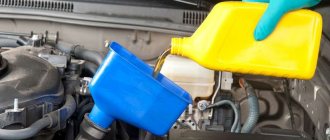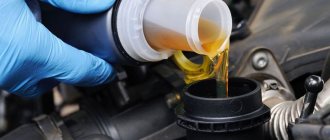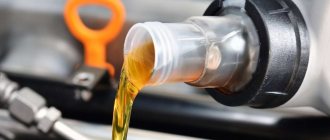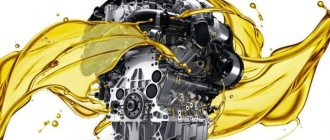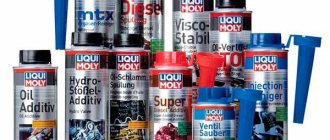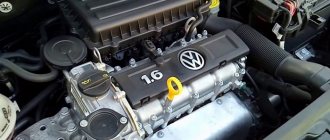The operating mode of a turbodiesel differs from the standard one. The main difference is the huge rotation speed of the turbine (above 100-200 thousand revolutions per minute), as a result of which the engine temperature rises (it can exceed 270 ° C) and its wear increases.
Therefore, oil for a diesel engine with a turbine must have the best protective and performance properties. The factors for selecting a specific brand of oil for a turbocharged diesel engine remain the same as for a conventional engine.
The main thing in this case is to follow the recommendations of the car manufacturer.
Differences between diesel oil and gasoline
Diesel engine oil runs on a lean fuel-air mixture under severe conditions. The fuel mixes with air and burns at an accelerated rate, resulting in higher loads and increased emissions of carbon dioxide, soot, sulfur and other hazardous substances.
Combustion products enter the crankcase for subsequent processing using the crankcase ventilation system. But this system does not always cope with a large volume of impurities, which is one of the reasons for the accelerated oxidation of the internal surfaces of the internal combustion engine. In this regard, high-quality diesel oil, compared to gasoline lubricants, as a rule, should have more effective cleaning properties and increased resistance to oxidation processes.
Gasoline and diesel oils have the same base, but a specific additive package. There are many more of them in diesel oil in order to obtain a highly effective basis for protection against deposits and colossal loads. We are talking about special detergent additives used only in diesel lubricants. The purpose of these additives is to remove from the working area that volume of oil and soot that the crankcase ventilation system did not have time to process.
Composition of oil for turbocharged internal combustion engines - mineral or synthetic?
There is no critical difference between choosing mineral water or synthetics. In addition, turbodiesels appeared long before the advent of synthetic base. And all early diesel turbo units worked perfectly on mineral oil.
On the other hand, synthetic oils are much more stable. What does this mean? As a rule, any oil loses its specified properties and characteristics over time. With synthetics, quality deterioration occurs quickly, but after the replacement period has expired. And mineral oil slowly degrades from the first day of use.
This means that in the middle of the replacement interval, the performance of mineral water will be significantly lower than that of synthetics.
For a turbodiesel, such a spread is undesirable, so it is better to overpay a little and buy at least semi-synthetics.
Choosing an oil base for a turbodiesel
All lubricants are divided into three categories:
- mineral
- semi-synthetic
- synthetic
Mineral oil
Mineral oil consists only of natural ingredients with a minimum set of additives. It is important to note that at first the effectiveness of such a lubricant will not be much different from the more expensive lubricants discussed below. However, over time, the situation will change not in favor of cheap mineral water, which has a shorter replacement interval. Since mineral water is made from processed oil and has only natural ingredients, this type of oil can quickly lose its beneficial properties under temperature changes and any other high loads. Therefore, it makes sense to use mineral water in modern realities only if it is provided for in the vehicle’s service book. The replacement period for such oil usually does not exceed 5 thousand km.
Semi-synthetic oil
Semi-synthetic oil is more relevant for used diesel turbo engines, even despite the presence of a mineral base and partially artificially created components in its composition. The effectiveness of semi-synthetics in comparison with mineral water is due to synthetic additives, thanks to which such oil better protects the engine from overheating, contamination by soot and combustion products. The replacement period for semi-synthetics in diesel turbo engines is 7 thousand km.
Synthetic oil
Synthetic oil should be used in modern turbodiesels with minimal mileage. Synthetics contain unnatural components that have a high degree of impact on engine parts. This helps to increase its power, reduce fuel consumption and improve environmental performance. High-quality synthetics are also characterized by long-term resistance to oxidative and corrosive processes, as well as the maximum degree of cleaning of rubbing mechanisms from dirt deposits. The timing for changing synthetic oil in diesel turbo engines ranges from 10 thousand km.
How does diesel differ from turbodiesel?
What is a turbodiesel? This is a diesel engine equipped with a turbocharger. This engine is designed to increase the vehicle's power by 25%. And if its design includes an intercooler, the vehicle’s capabilities increase by another 10%.
The role of a turbocharger is to force air into the cylinders at very high pressure. A large amount of air in the working area of the engine increases its capabilities, which the driver feels when sharply pressing the accelerator pedal. During operation, the temperature of the turbocharger can reach 950-1000 degrees Celsius.
In this case, engine oil is used not only to lubricate rubbing parts and prevent them from overheating, but also acts as a radiator for the turbine itself.
If the turbine overheats, its failure will affect the functionality of the internal combustion engine, since the turbocharger and the engine have a common lubrication system. Shutting off the turbine will cause the car to starve of oil. And this is fraught with jamming of the crankshaft and lengthy repairs.
To prevent such consequences and ensure turbine stability at high temperatures, engine oil for turbodiesel engines must be selected correctly.
Choosing oil viscosity for turbodiesel
As a rule, all-season and universal motor oils for diesel and gasoline engines with turbines are in greatest demand among owners of diesel cars. Such lubricants are equally well suited for different climatic and road loads at any time of the year. On the other hand, some car enthusiasts still prefer certain types of oils that are designed specifically for diesel engines. Some companies still specialize in such oils.
In fact, the viscosity of the oil, as determined by the SAE standard, is much more important. It must be selected depending on climatic conditions and the age of the car. Practice shows that owners of older cars switch to a more viscous oil than specified in the factory documentation. This means that for cars with low mileage, you should use only the viscosity recommended by the manufacturer.
The most popular is the all-season viscosity 5W-40, using the example of which we will consider the temperature indicators for optimal operation of a diesel engine with such oil.
So, 5W-40 diesel lubricant is capable of effectively lubricating and washing the engine at temperatures down to minus 35 degrees. As for high-temperature viscosity, in this case such oil can withstand temperatures up to plus 40 degrees.
Energy saving oils
Stages of motor oil production
There is a category of special technical fluids that have a rare property: the ability to reduce fuel consumption. Lower consumption ensures an increase in the environmental friendliness of the car, and also allows the driver to significantly save personal funds. This property is achieved by maximizing the reduction in friction losses during operation of the engine compartment. It is easy to identify an energy-saving liquid - its marking includes the designation HT/HS (characterizes the degree of viscosity of the protective material at high temperatures and high shear rates).
Conventional oil, which does not promise to save fuel mixture, heats up to 150 degrees Celsius, maintains a stable viscosity and comprehensive protection over all parts of the engine compartment. If you slightly reduce the degree of viscosity, it will be easier for the mechanisms to interact with each other, reducing the amount of power loss. This interconnectedness makes it possible to achieve minimal fuel mixture consumption. However, not every turbodiesel will “like” energy-saving oil. The fact is that by creating a thinner film, the oil risks leaving some of the mechanisms “unattended,” which will inevitably lead to serious problems. This technical fluid can only be used on those engines that are designed to allow the use of this type of lubricant. And you can only learn about such motor capabilities from the vehicle manufacturer’s manual.
Characteristics of diesel oils
SAE standard
As mentioned above, SAE determines the viscosity of an oil. For diesel lubricant, the preferred viscosity is 5W-30, 5W-40, 10W-30 or 10W-40. By the presence of the letter W (Winter), it is immediately clear that these are all-season oils, suitable also for winter use. To the left of it is the low-temperature viscosity, and to the right is the high-temperature viscosity. Let's consider the permissible operating temperatures of oils with different types of viscosity, most suitable for diesel turbo engines:
- 5W – up to minus 25 degrees.
- 10W – up to minus 20 degrees.
- 15W – up to minus 15 degrees.
API standard
API is an American classification that divides oils according to their performance properties. There are two categories here - S (for gasoline engines) and C (for diesel engines). The API value depends on the condition of the engine and the year of manufacture of the car - the higher the letter in the alphabet, the higher the quality of the oil. For diesel engines, the following API abbreviations are provided:
- CF, CF-4
- CH, CH-4
- CI, CI-4
- CJ, CJ-4
What is the required API for universal oil?
When choosing a universal oil for diesel turbo engines, you need to pay attention to the API CF/SJ marking. The main thing here is not to get confused, since, for example, universal oil labeled SJ/CF is more suitable for gasoline engines.
ACEA standard
- ACEA is a European classification, which is divided into two categories:
- A/B – for gasoline engines and light diesel engines (A1/B1, A3/B3, A3/B4, A5/B5)
- C – for gasoline engines and light diesel engines with catalysts (C1-C4)
- E – for powerful diesel engines subject to high loads (E4/E9)
Bottom line
It is impossible to say unequivocally which diesel engine oil is best to fill, because each car has its own unique requirements. Vehicle manufacturers empirically calculate the oils that are most suitable for certain power plants, which is why you should listen to their recommendations. If for some reason you do not have a service book for your car, you should not consult salespeople in stores - their knowledge may be limited only to information from the Internet. In order to calculate the required viscosity and consumer properties of diesel oil, just call the official representatives of the automaker and check with them for information.
The best diesel oil for turbodiesel. Our choice
Castrol Magnatec Professional 10W-40 A3
156EBB – 600 RUR per 1 liter
Characteristics:
- Type – semi-synthetic
- Viscosity SAE – 10W-40
- API approval – SN
- ACEA approval – A3/B3, A3/B4
- Purpose – gasoline, diesel
- Viscosity index – 155
- Kinematic viscosity at 40/100 g. – 93.14/14.09
- Density at 15 g. – 0.8605
- Pour/flash point – minus 37/200.5 degrees.
Castrol Magnatec Professional 10W-40 A3 oil has a high-quality semi-synthetic base, which is balanced in its all-season parameters, close to more expensive synthetics. Despite its low cost, this lubricant is characterized by optimal washing and lubricating properties, stable pumping in cold and warm weather, as well as high engine efficiency and environmental friendliness.
Does the manufacturer influence the quality of the oil?
The brand does not play a special role, the main thing is that the product was purchased from an official dealer, and not “from hand”. It so happened that today the most popular oils on the market are Mobile and Castrol liquids. True, new manufacturers are gradually appearing, the quality of their oils is not inferior to famous brands. But you can’t guess, that’s why car enthusiasts give preference to trusted companies.
If we talk about the differences between the products of Mobile and Castrol, then by and large there are none. Both manufacturers produce motor oils with excellent performance characteristics, so when purchasing MM from these giants, you do not risk running into a pig in a poke.
Useful tips
The widespread opinion about the possibility of assessing the quality of motor oil by the rate at which it darkens is completely wrong, even if we are talking about cheap mineral water. Darkening of diesel engine oil inevitably occurs due to the penetration of soot into it and, on the contrary, signals the effective operation of dispersant additives.
When choosing motor oil for modern engines with diesel particulate filters (DPF), it is imperative to use grades with an ash content that meets the requirements of the equipment manufacturer. If the service documentation allows the use of mid-ash oils (MidSAPS), low-ash LowSAPS oils can also be used. But, if the service book indicates the use of only low-ash motor oils, the use of MidSAPS is not allowed, since in this case it is possible to reduce the service life of the particulate filter. Diesel fuel also affects the service life of the particulate filter; the more sulfur it contains, the sooner the DPF will fail, regardless of the ash content of the engine oil.
Why is conventional oil not suitable for a diesel engine with a turbine?
Because there are significant differences in the operation of these two motors. The thermal load of a “diesel” heats up to a thousand degrees at a speed of 1.5/min. Such motor hyperactivity leads to an increase in the temperature of the upper groove of the piston. On average, it ranges from 250 to 280 degrees. This figure differs significantly from gasoline units. As a result, for a car with such an engine, an oil that can withstand such overheating and loads should be used.
It is worth noting that detergent and dispersant additives predominate in turbodiesel engine oil. Thanks to them, the level of soot on important “organs” of the engine is significantly reduced. They also contain a large number of alkaline and other additives that reduce the level of oxidation.
Fuel system condition.
The service life of the particulate filter also depends on the condition of the fuel system - the worse the fuel system works, the worse the injectors spray, the more soot is formed during fuel combustion and the higher the load on the particulate filter.
Do not forget that “poor performance of the fuel system” always (!!!) begins with its (system) contamination: diesel fuel is a petroleum product that, like oil, forms varnish and resinous deposits that clog both the micronozzles of the injectors and the fuel rail, and fuel pressure regulator in the rail and... You can read about this in a separate article.
Therefore, do not neglect timely and regular maintenance of the fuel system.
